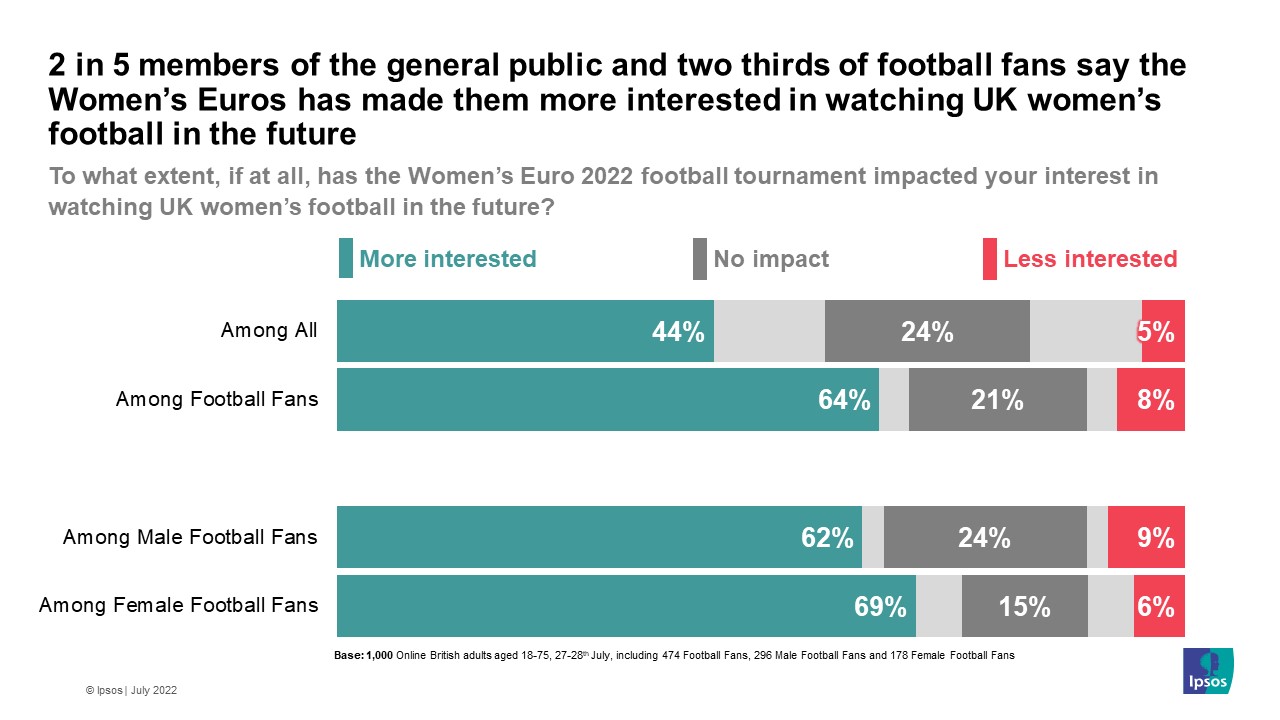Almost two-thirds of football fans more interested in watching women’s football following Lionesses success
- 44% of the British public – and 64% of self-identified football fans – say they are more interested in watching women’s football following the Women’s Euros.
- More than half (57%) of Britons are interested in the tournament – increasing to 4 in 5 amongst football fans (82%)
- Over the course of the tournament, there was a 14ppt decrease in the proportion of football fans who say the women’s game is less exciting to watch than the men’s (34% following the semi-finals as compared to 48% during the group stages).
- However, perceptions of the skill of the women’s game have been harder to shift, with the share of football fans who feel the women’s game is less skilled staying around 4 in 10 (39% following the semi-finals as compared to 42% during the group stages)
Following the Lionesses’ 4-0 win over Sweden in the Women’s Euro semi-final, 44% of the British public – and 64% of self-identified football fans – say they’re more interested in watching women’s football in the future. Verbatim comments cited the “less tribal and aggressive” atmosphere, as well as the inclusive nature of the women’s game as factors that have driven this interest, with one respondent saying they thought the tournament was “more for everyone” and less of a “boys’ club.”

This growth comes from a tournament that has drawn interest from more than half the country, with 57% of the general public – and more than 4 in 5 (82%) football fans – saying they’ve been fairly or very interested in this summer’s tournament. The tournament has even drawn interest from those who previously didn’t engage with women’s football, with 21% of those who reported not being interested in women’s football prior to the tournament now saying they’re more interested in watching in the future.
The Lionesses’s success has likely played a part in driving engagement, with more people saying they’ve been interested by the end of the tournament than said they intended to follow it closely during the group stages. During the group stages at the start of the tournament (8th/9th July), only 27% of the general public intended to follow it closely. By contrast, this is nearly half of the share of Britons who reported similar intentions for the Men’s Euro tournament last summer (53%). Similarly, while 93% of football fans intended to watch the Men’s tournament closely, this figure was 54% for the Women’s tournament.
Perceptions of the women’s game allude to barriers to growth – but also opportunities
The progression of women’s football will require overcoming enduring perceptions of being less skilled and less entertaining than the men’s game – perceptions that this summer’s tournament has had mixed results in shifting.
Amongst the general public, 1 in 4 (24%) asked during the group stages felt that women’s football was less skilled than men’s football, a similar proportion (27%) still holding this perception following the semi-finals. Perceptions of the skill of the women’s game amongst football fans is even less positive, with 4 in 10 (39%) now saying the woman’s game was less skilled – consistent with the 42% who said the same at the start of the tournament. This opinion is more strongly held by male football fans (45%) than female football fans (26%).
Both during the group stages and following the semi-final, roughly 3 in 10 Britons said that women’s football is less exciting to watch than men’s football (30% and 27%, respectively). However, perceptions amongst football fans have improved, with 48% saying the women’s game was less exciting during the group stages, compared to 34% during the semi-finals.
Two avenues for opportunity for the women’s game are the perceived safety and accessibility in attending women’s football matches. More than 4 in 10 (43%) Britons and over half (55%) of football fans perceive women’s football to be safer to attend than men’s football. Further, 30% of the general public and 44% of football fans said women’s games were more accessible to attend.
Meanwhile, although 2 in 3 (64%) members of the public are aware of FAWSL (FA Women’s Super League), the UK’s highest league for women’s football, the fact that more than a third are not shows there is still scope to build awareness of the competition - with the success of the Lionesses this tournament offering the potential to improve attendances in the future.
Kelly Beaver MBE, CEO of Ipsos in the UK and Ireland, said
This year’s Women’s Euros have been a brilliant opportunity to highlight the talented female athletes we have in Europe – not the least of which England’s own Lionesses! Our research demonstrates that there is growing interest around the women’s game, but that there’s more work to be done around challenging perceptions of skill in women’s sport. The perceived higher levels of safety and accessibility of attending the women’s game provides a great opportunity for the FAWSL and Lionesses to build on this momentum to attract even more fans and families to matches in the 2022-23 season.
Technical note
- For data collected on 8th-9th July (during the group stages): Ipsos interviewed a representative quota sample of 2,196 adults aged 16-75 in Great Britain. Interviews took place on the online Omnibus. Data has been weighted to the known offline population proportions. All polls are subject to a wide range of potential sources of error.
- For data collected on 27th-28th July (following the semifinals): Ipsos interviewed a representative quota sample of 1,000 adults aged 18-75 in Great Britain. Interviews took place on the online Omnibus. Data has been weighted to the known offline population proportions. All polls are subject to a wide range of potential sources of error.



